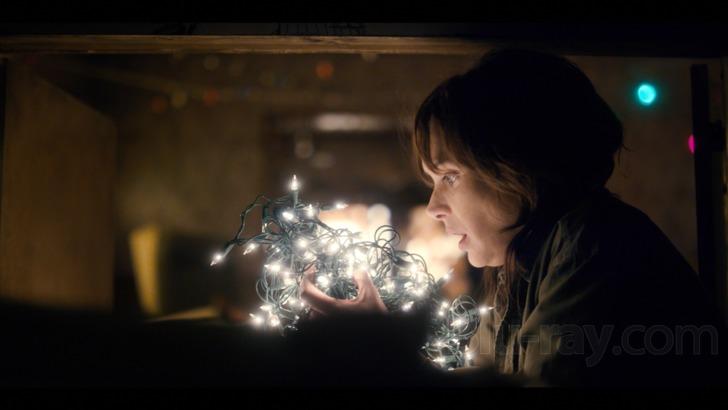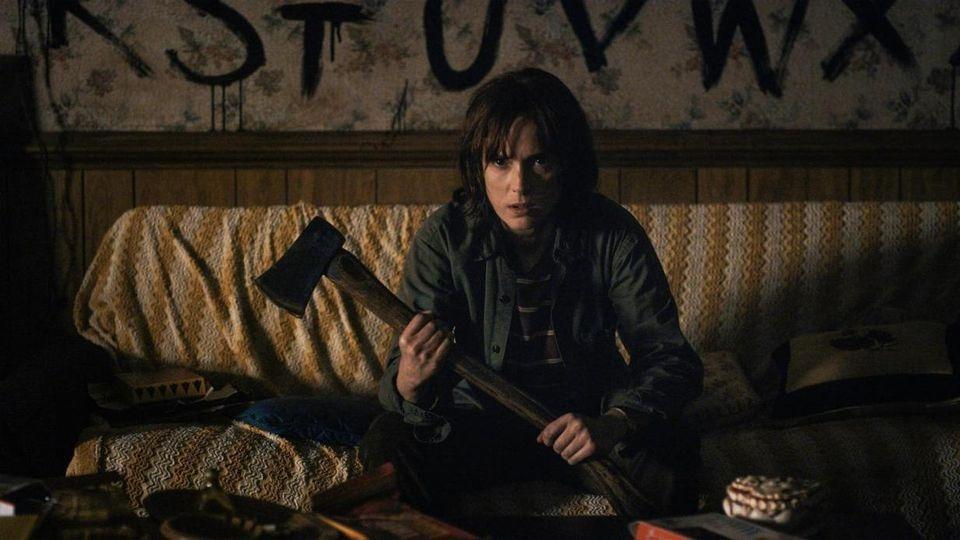Introduction
Parenthood refers to a state of being a parent and taking the responsibilities involved, such as providing emotional support and maintaining a healthy relationship with children to enhance proper upbringing. As depicted in the series Stranger Things, parents share a special connection with their children to the extent that they get depressed and filled with fear, frustration, and guilt when their kids are in trouble. As portrayed in Stranger Things, it is clear that parents have fallen into depression and fear due to the mysterious kidnappings of children. Aftermaths of the Will Byers’ abduction in the first episode, “The Vanishing of Will Byers,” Stranger Things depicts the challenges that sometimes come with parenting.
Scenes in the Series Stranger Things

Figure 1 depicts an essential medium used to convey information visually; it expresses Joyce’s connection with her son. For instance, the image provided portrays parenthood as a process of adults connecting with children and enduring all challenges to protect their children. Joyce Byer’s image symbolizes a parent’s actions to regain connection with her abducted child. Joyce Byers is holding a twinkle light which symbolizes the connection between her and the missing child Wills Byers. The writer connects the ideas represented by this image to get the message across. This shows the strength and determination of a mother’s love for her child. For instance, Joyce is doubted by everyone around her, including Jonathan, but still, she does not give up on what she believes to be true. She continues to communicate with her son Wills through the lights, hoping to rescue him. Additionally, looking at the effect of the upside-down world on the lights gives her hope that her son is still alive.
The scenes represented by the image perfectly represent the cinematic theme of parenthood and its challenges. The scene begins with an outside view of Joyce Byers’ house. There is a medium shot of Joyce smoking cigarettes and a barking dog. Joyce walks into a room full of blinking Christmas lights while observing and touching them keenly. She moves a drawer, opens a closet, collects twinkle lights, and sits inside the closet while holding them. Joyce talks to Will via the twinkle lights, and when they flicker, she gets excited. Joyce asks Will to ‘blink once for yes, twice for no.’ Additionally, Joyce asks Will if he is alive, and the light blinks once, and when asked, ‘are you safe?’ the light blinks twice (R. Duffer, 2016; M. Duffer, 2016, ep. 3). This scene shows the strength and determination of a mother’s love for her child. Joyce is doubted by everyone around her, including Jonathan, but still, she does not give up on what she believes to be true. She continues to communicate with her son Wills through the lights.

In Figure 2, Joyce Byers is holding a non-human element, an axe that acts as a shield and symbolizes the courage of a parent to face a monster to rescue her missing son. Unfortunately, this is not depicted throughout the season; at a point, the parents suffer and experience negative impacts in their parenthood journey. For instance, they fall into depression, lack support from their partners, and are always filled with fear about their children’s welfare.
For instance, depression is one of the challenges in parenthood that causes one to be persistently sad, have anger issues, and have less interest in participating in fun activities. It affects how people perceive, judge, and act toward people and things. For instance, Joyce Byers tends to fall into depression when she realizes that her son Will Byers is missing, and the Hawkins police department searches for several days without success. This denied her state of happiness because she ends up crying daily, and individuals, for instance, Jonathan, assumes she is crazy because of acting weirdly. This shows that despite the emotional connection between Joyce and her son, she is still mentally and physically affected, negatively impacting her lifestyle.
Parents experience disobedience from their children in their parenthood journey because of their children’s temperament. Temperament is the way children react to society. For example, Mike goes against his parent’s rule when he looks for Will Byers at night with his friends Dustin and Lucas. They do this because they feel their parents are not concerned about their friends, making them act irrationally against their parents’ will. This is different from society’s expectations, which advocate for total respect from children to parents.
In real-life situations, parents are required to provide emotional support always and deal with unexpected realities during their parenthood journey, but this is not the case in the series Stranger Thing. Joyce appears to be emotionally weak due to missing her son. She gets stressed and ends up not being emotionally present for her son Jonathan, who takes the initiative to care for his mother.
According to society, partners should maintain good relationships with their significant other for better upbringing of their children; this is different in the series Stranger Things. For instance, when Will’s dad is informed about his son’s disappearance, he does not take any initiative to find him, nor does he come to help his partner, Joyce Byers. Additionally, when he comes over after the burial, he does not come to offer her emotional support. He is materialistic and only aims to get money, which makes him selfish, and when informed that his child may still be alive, he does not care. This is different from society’s expectation, where partners are expected to be role models and financially and emotionally support their children.
Parenthood involves one being able to know the whereabouts of their children, but in series, the situation is different from today’s world expectations. For instance, Ted and Karen are shocked to realize that their son has been hiding Eleven, who is on the run in their house. When the doctor asked the two parents where their son was, they had no clue (R. Duffer, 2016; M. Duffer, 2016). Additionally, Joyce is shocked when she realizes that her son Jonathan has been planning to go monster hunting without her knowledge, which means that they do not consider or value what their children engage in. This clearly shows the engagement of parents with their children in the series Stranger Things is different from that of real-life situations. The reason is that parents tend to engage with their children in other activities, such as helping them tackle homework challenges and engaging in recreational activities with their children.
Conclusion
In conclusion, the scene where Joyce is seen holding a Christmas light and another scene holding an axe create a better analysis that conveys an act of parenthood. It is visually evident that in the scenes, parents face challenges, for instance, getting into depression, fearing their children’s welfare, and being materialistic. Other parents do not offer support to their children, and children tend to disrespect their parents, similar to the real-world situation. However, it is also clear that parents cannot offer full support to their children due to unavoidable circumstances such as monster attacks.
Reference
Duffer Ross, & Duffer Matt (Executive Producers). (2016). Stranger Things Season 1 [Tv series]. IMDB.